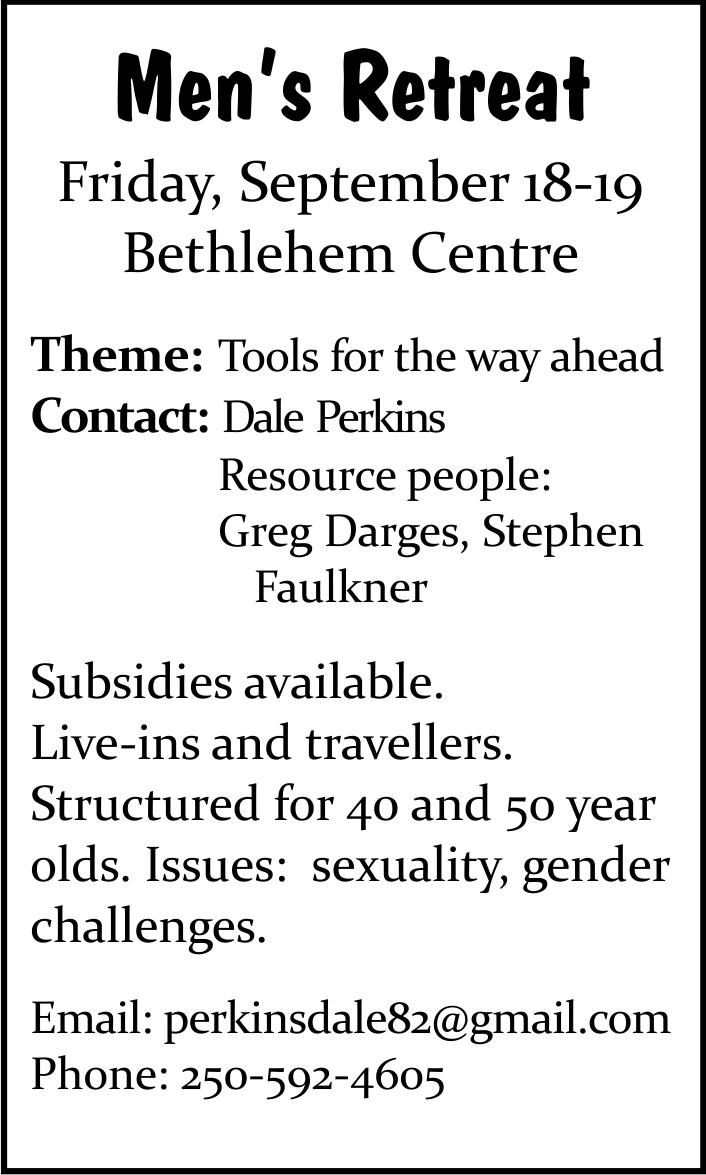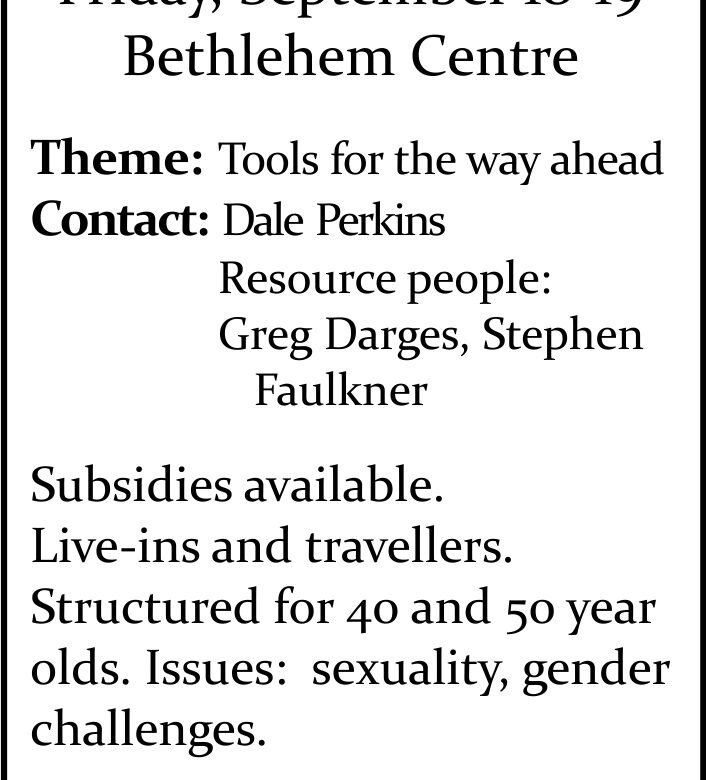Other news
Shamanic Healing Theme of Men’s Retreat at Bethlehem Centre
Volume 34 Issue 4, 5 & 6 | Posted: July 5, 2020

How would you enjoy a weekend retreat with a medical doctor who is a shamanic healer in the traditional First Nations Cowichan band style, a liberal minded Jewish rabbi with clinical counselling background; an Anglican priest steeped in Jungian transformational psychology and an addictions therapist who is a United Church minister?
Such was the men’s retreat organized by Rev. Dale Perkins January 24-25th at Bethlehem Spirituality centre, the former Roman Catholic Retreat Centre run by Benedictine Nuns for thirty year.
Some 25 men attended, ranging in age between 37 and 86. The overall theme was a healthy masculinity. Attendees came from throughout the region. Some were accommodated in the centre, others travelled from home. Subsidies were available so that income was not an issue.
How would you enjoy a weekend retreat with a medical doctor who is a shamanic healer in the traditional First Nations Cowichan band style, a liberal minded Jewish rabbi with clinical counselling background; an Anglican priest steeped in Jungian transformational psychology and an addictions therapist who is a United Church minister?
Such was the men’s retreat organized by Rev. Dale Perkins January 24-25th at Bethlehem Spirituality centre, the former Roman Catholic Retreat Centre run by Benedictine Nuns for thirty year.
Some 25 men attended, ranging in age between 37 and 86. The overall theme was a healthy masculinity. Attendees came from throughout the region. Some were accommodated in the centre, others travelled from home. Subsidies were available so that income was not an issue.
Meals were provided, a holistic natural food diet. Staff for the centre were available at all times for direction and assistance.
The program consisted of a Friday Night presentation by United Church minister and prison chaplain on addictions. Greg Darges spoke from personal experience on how the traditional male attitude toward marriage relationships is fraught with destructive traits, using his own first marriage as an example, where he entered into it as a rescuer of his partner, which resulted in victimization and the resentment that ensues.
The Saturday morning events started with Medical Doctor Stephen Falconer of Duncan, who serves as a shaman with the Cowichan band of that region. His presentation was much more directly participative. Words and explanations were short while healing ritual as experienced by the First Nations was paramount. Drumming and chanting were part of the process as well as talking sticks and rain sticks and pacing and the explanatory terms that arise from that.
He told his own life story as a New Zealand medical man who moved to Northern Saskatchewan to work with Natives, eventually relocating to the Island. His analysis is that a deeper level of healing is required for western medicine and this the ten thousand year traditions of First Nations provides.
The group was broken into two, those who requested healing, those who served as healers. Only one man, an accountant, reserved the right to stand outside the healing circle. The healers moved around those in the centre, laying on hands and praying. Stephen Faulkner exhibited an ease and facility for the process that seemed to maximize the effect.
Rabbi Louis Sutker of Victoria, led an exercise in identifying one’s deepest values and abiding hopes and issues. Part of the process was to line up according to age, and then pairing up the youngest with the eldest in groups and discussing questions such as the deepest regret or the most memorable experience. Reporting in the larger group led to further plenary discussion.
In the afternoon the fourth resource person Anglican priest Andrew Twiddy of Qualicum did a biographical presentation on his psychological and spiritual transformative experiences using Jungian categories of thought. He is planning a further workshop with the Rev. Cynthia Bourgeault using the same categories of analysis and therapy.
To finish the day, Dale Perkins led an evaluation and assessment of the experience. Overall the ratings were very positive and a further workshop for the fall is being planned and organized by members of the event.
My own experience was interesting personally. Unsure of my role as a reporter or an attendee, an animator or just as a supporter of the organizer who is a close friend, I entered into the process as best I could, moving between levels of engagement but more involved than not, even in my unconscious reservations.
 The two days with the travel proved exhausting but the next three days after I got home and could reflectively absorb the event proved as hoped, quite transformative, with a freshness and new energy emerging.
The two days with the travel proved exhausting but the next three days after I got home and could reflectively absorb the event proved as hoped, quite transformative, with a freshness and new energy emerging.
My critique of the event was that the feminine dimension was not directly alluded to, more work on synchronicity of meaningful chance as well as the shadow and anima projection. These were dealt with indirectly but the power of such work lies often in making it more fully conscious, and this level of work is what I would hope to see in the followup workshop now scheduled for September 18-19 at Bethlehem.

